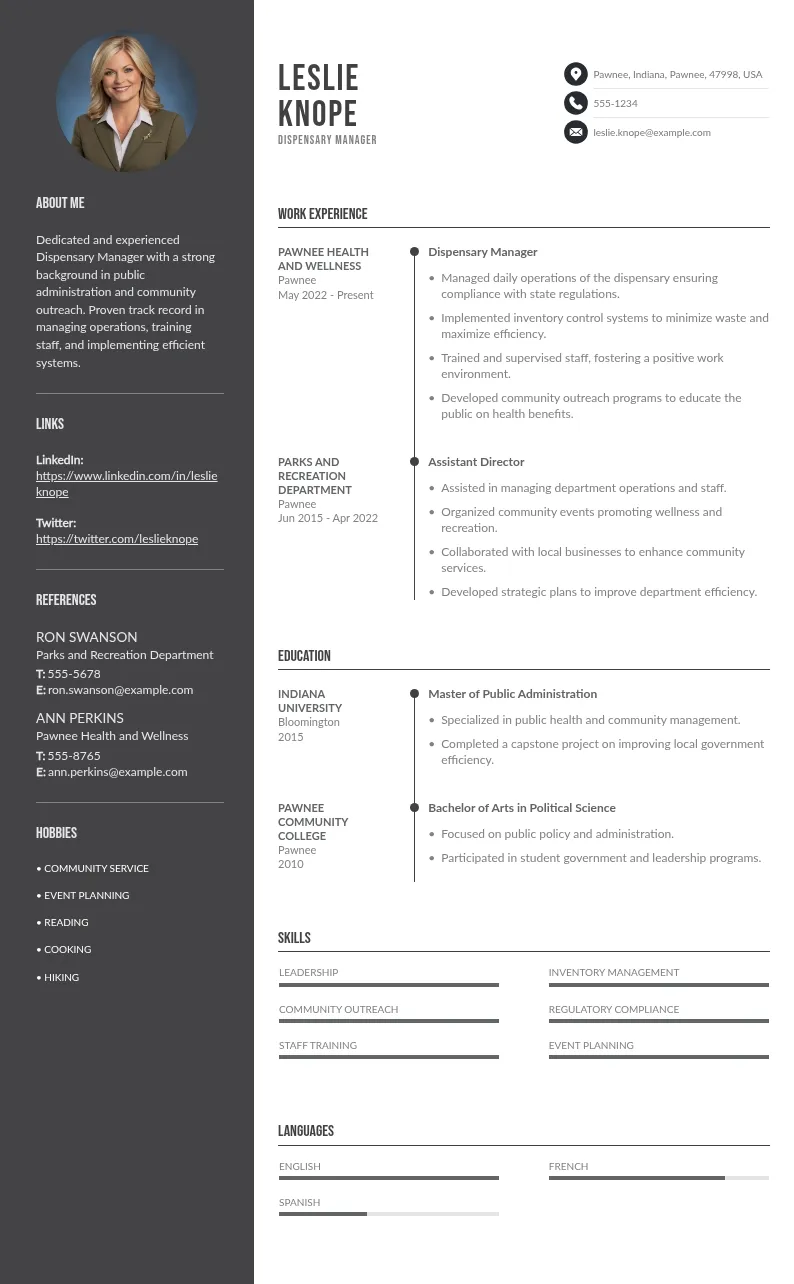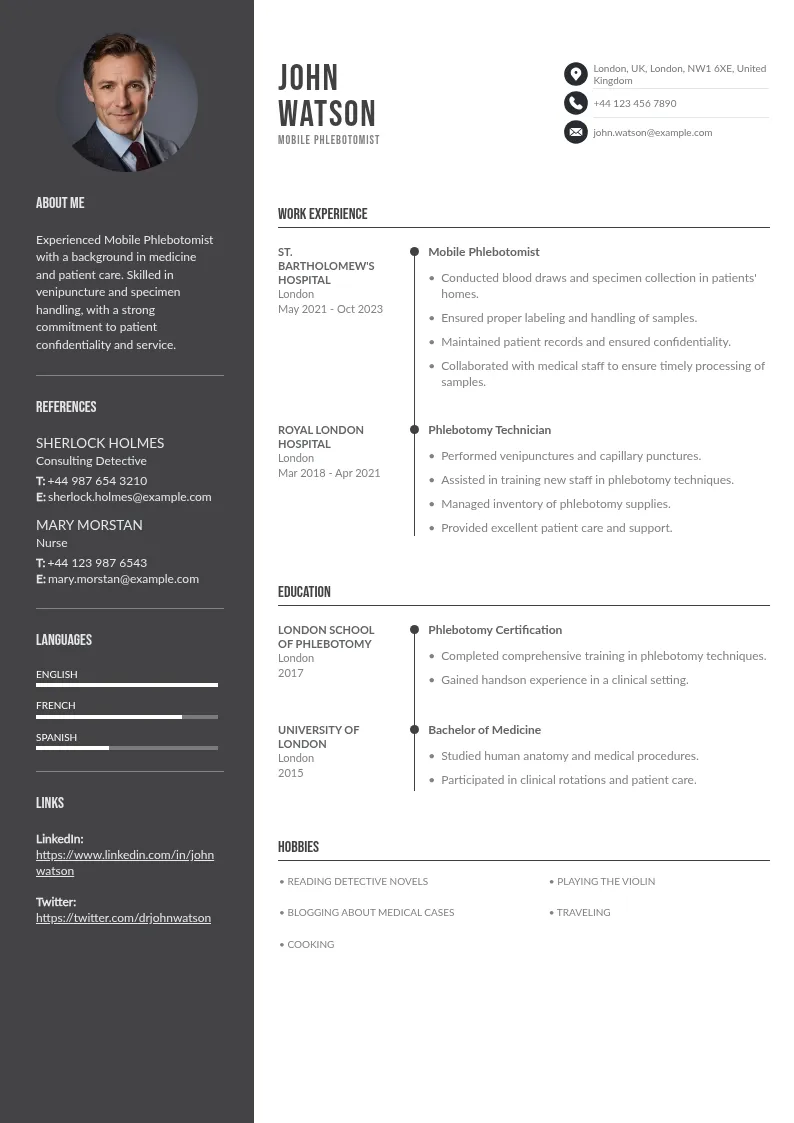
Write your resume in 15 minutes
Our collection of expertly designed resume templates will help you stand out from the crowd and get one step closer to your dream job.


So, if you are looking to grab an entry-level associate project manager position or be a Senior Project Manager, leading projects for more than one project team at once learn all about the project management career path.
In this guide, we provide an overview of what it takes to advance your career in project management. We are covering all from project management education to certifications by providing you insights on:
- Project Manager Career Path
- Various Roles in project management
- Salary Ranges for Project Managers at Every Career Stage
- Benefits of a Career in Project Management
- Key Skills for Project Managers
- Top Project Management Certifications to Elevate Your Career
- Frequently Asked Questions on Project Manager Career Path
- Conclusion
Project Manager Career Path

Your journey into the project manager career path starts from foundational roles where you learn vital project management skills and practical experience.
These roles are important in the sense that they prepare you to learn about certain paradigms of project management (including but not limited to project planning, risk management resources, and allocation) as well.
With experience, you can rise to more senior positions (like senior project manager or program manager) that involve managing larger projects and teams.
Regardless of the actual level on this successful career path, there is a mix of hard and soft skills needed at any given stage, including good interpersonal communication, strong organizational skills with an eye for keeping track and managing budgets in addition to client satisfaction.
Various Roles in Project Management

In the scope of the project management career path, there are certain specific positions that professionals may opt for. Each position is of great importance in taking charge of and executing various projects. Some of the most widely spread positions in project management are listed below.
1. Junior Project Manager
A junior project manager is more of an entry-level role where the individual works on a part of the project and assists in overseeing or completing less complex or smaller in size projects. They work under the supervision of senior managers and have key responsibilities.
2. Project Coordinator
A project coordinator is responsible for the project coordination and assisting the project manager in administrative duties like documentation, communication, and scheduling. They help manage the project structure and monitor the progress of the project team, turning out to be a useful add-on to project management.
3. Assistant Project Manager
The assistant project manager reports to a senior project manager and he/she helps to look after some parts of the project which he manages or takes care of. This position includes more of leading the projects while the project management requires managing the teams and is largely goal-oriented on compliance to project schedules and milestones learning.
4. Project Manager
The management center plans that the project manager makes and instills expire within the entire lifecycle of a project. He or she performs risk management, assigns and schedules resources to the project, and makes sure that the completion of adverse impinges on project management skills – defining the ridiculous and within project time - elaboration and schedule, monitoring progress, and resource management.
5. Project Management Professional (PMP)
This is a specialist certification in the field of project management. With this, certified individuals, usually are promoted to upper management e.g., senior project managers or program managers. It’s a world-recognized certification allowing one to run projects efficiently.
6. Chief Operating Officer (COO)
Some project managers advance into executive roles like that of the chief operating officer (COO) where they utilize their own project management experience and related capabilities to run commercial activities in a certain organization.
Salary Ranges for Project Managers at Every Career Stage

The value of a project manager depends on several factors i.e., location, experience, industry, certification, etc. The following are the projected average salary ranges for project managers at different levels:
1. Junior Project Manager
Most new or semi-experienced project managers earn between $50,000 per annum. Nevertheless, this eligibility can fluctuate depending on the geography and industry profile of the person.
2. Project Manager
After gaining 1-2 years of experience, they can get well-paying jobs. When it comes to a project manager, the usual value of remuneration lies around $96,0000. This range reflects increased managerial skills such as larger projects, bigger teams and so more hands-on experience.
3. Senior Project Manager
Complex projects with senior project managers often have salaries of around $130,000. Higher and hence fatter paychecks are accompanied by more responsibility. Senior project managers take on higher-level projects with a more extensive budget and risk.
4. Program Manager
Their remuneration will be in the region of $151, 200 dollars and they typically supervise many projects at the same coordinate cohesion towards set objectives.
Benefits of a Career in Project Management

Careers in project management have a lot of appeal and excellent reasons to seek out this career path. Here are some key benefits:
Opportunities Across Different Sectors:
- Project management is a broad area that extends across many different industries. Professionals can find opportunities in different sectors, from software development to construction project management.
High Career Growth and Promotion:
- A project management career path provides scope for good opportunities and growth in the profession. You may begin as a junior project manager or project coordinator and progress to more senior positions such as senior project manager, program manager, etc.
Strong Job Market and Career Security:
- Because of the increased dependence on project managers to manage successful projects, there is a high demand for proficient people. The demand translates into job security and high pay.
Building Skills:
- On the practical side of things, a career in project management helps provide various skills that are useful and can be applied elsewhere such as risk management, project planning, and good implementation (resource allocation).
High Potential Wages:
- People working in these project management jobs tend to get excellent salaries. Higher salaries are often associated with more senior roles like senior program manager or a buck up to the level of organization such as program manager.
Key Skills for Project Managers

To excel as a project manager, a combination of essential skills is necessary. These skills allow for efficient project planning, organization, and completion of successful projects. The following are some key skills for project managers:
1. Strong Organizational Skills
Project managers must possess excellent organizational skills to juggle multiple projects at once and ensure all tasks are completed on time and within budget.
2. Excellent Communication Skills
Project managers require excellent communication capabilities to address their team’s requirements and provide them with the necessary updates.
Excellent communication between many project managers ensures that all is on plan and that everyone the project manager is overseeing understands the end goal and plan. This carries the responsibility matrix right to the bottom level of a project.
3. Risk Management
This is the process of identifying potential hazards in future projects and developing solutions to prevent them from occurring in the first place. A project manager must be seen to be addressing the risk at all times and act like a risk manager. Making decisions for the good of the project is the act of mitigating risk.
4. Problem-Solving Skill
Critical thinking and problem-solving skills are honed and refined skills that are required to solve the challenges that arise throughout the lifecycle of a project. These problems may be logical, mathematical, interpersonal, or technical.
5. Proficiency in Project Management Software
Project management software is ideal for tracking progress, arranging resources, and collaborating with others effectively. Hence, a project manager should be knowledgeable about the numerous software options available.
6. Leadership and Team Management
Likewise, being a strong leader is a necessary quality for any project manager. A successful project manager should be able to inspire the team, assign roles responsibly to every member, resolve disagreements, and aid cooperation among team members.
7. Time Management
This is aimed at ensuring that team members work on their predetermined assignments and that all programs execute projects are performed within the specified time frame. This start-to-finish approach ensures that work is completed on time.
8. Financial Acumen
A project manager should be well-versed in financial modeling. The project manager role must manage and allocate project resources.
Commitment to mastering this key skill will make project managers effective in their roles and capable of contributing profoundly to their organization’s overall success.
Top Project Management Certifications to Elevate Your Career

Certifications are a vital part of the project management career path. They facilitate a project manager’s upward mobility, increase credibility, and boost career advancement potential. The following is a summary of project manager certifications that are considered essential:
1. CAPM Certification
The Certified Associate in Project Management certification, CAPM in short, is an entry-level companion. It is offered by the Project Management Institute and is best suited for people who are new to project management or are searching for greater qualifications for an entry-level job.
2. PMP Certification
The Project Management Professional certification, PMP for short, is the sector’s most recognized and respected credential.
This certification is also supplied by the Project Management Institute, to wise investment professionals who have already shown that they can direct and organize complex jobs and groups.
3. PRINCE2 Certification
PRINCE2 is a procedure-oriented methodology for project management that is very prevalent in the United Kingdom and Germany.
The PRINCE2 certification comes in various versions, including Foundation and Practitioner. However, it is frequently taught as a composite course labeled the practitioner course.
4. PMI-ACP Certificate
The PMI Agile Certified Practitioner (PMI-ACP) certification is tailored for project managers in the agile environment.
This certification shows a high level of expertise in agile methodologies, an essential requirement for managing software development projects and other dynamic initiatives.
5. PgMP Certificate
Also, consider the PgMP certification offered for a program manager who manages multiple and complex projects across the organization.
The Program Management Professional certification reflects the expert level of proficiency in managing large programs and projects.
6. CompTIA Project+
CompTIA Project+ certification meets the needs of individuals who manage small projects and project coordinators seeking to advance their project management careers.
This certification provides a link between certified professionals and organizations where they can manage projects from the beginning to the end.
Conclusion
The attainment of relevant project management certifications is beneficial not only for the development of one’s career but also for the validation of one’s knowledge. Obtaining The CAPM or PMP accreditation or some sort of PMI certification; serves the purpose of improving the understanding of such aspects of business administration as project management principles, risk management, and resource management.
Project management qualifications provide career advancement in terms of a higher position and level of engagement. Whether you are a beginner or a professional seeking higher bench-marked positions, acquiring the right certification can boost your chances of climbing the career ladder significantly. Having a number of these qualifications makes it easier for you to manage and execute intricate projects and oversee teams successfully therefore making a worthwhile contribution to qualified project management.

















